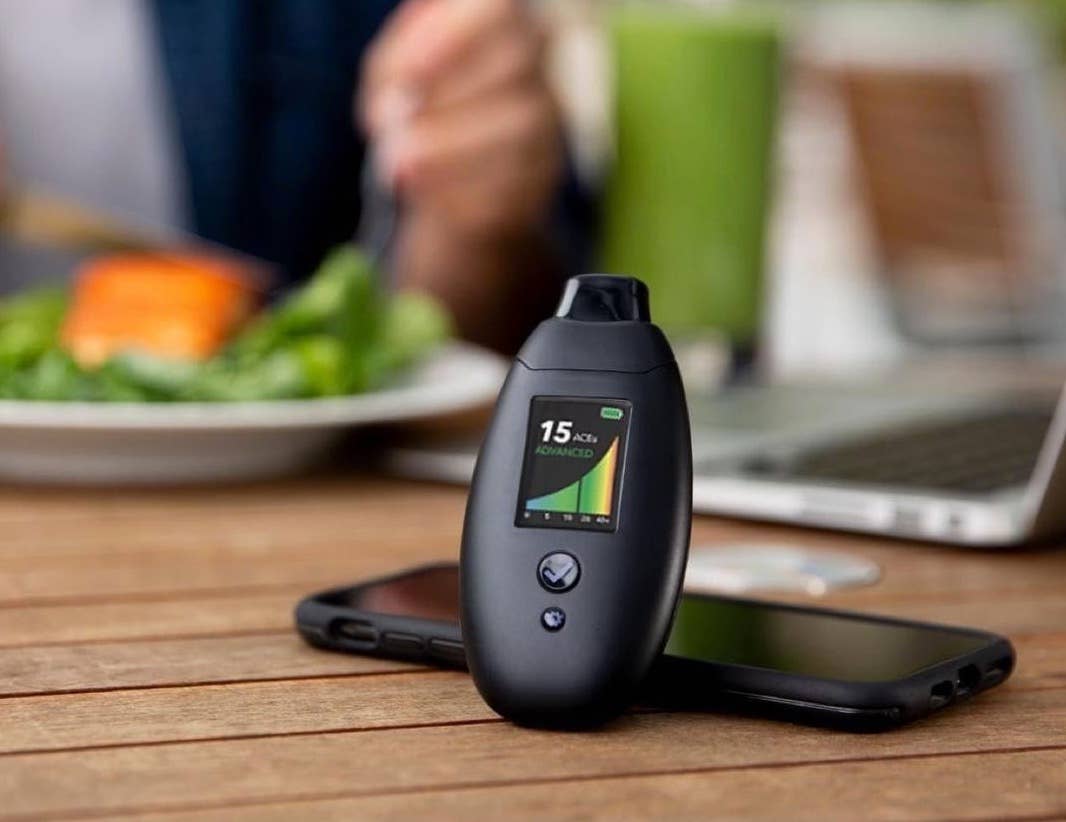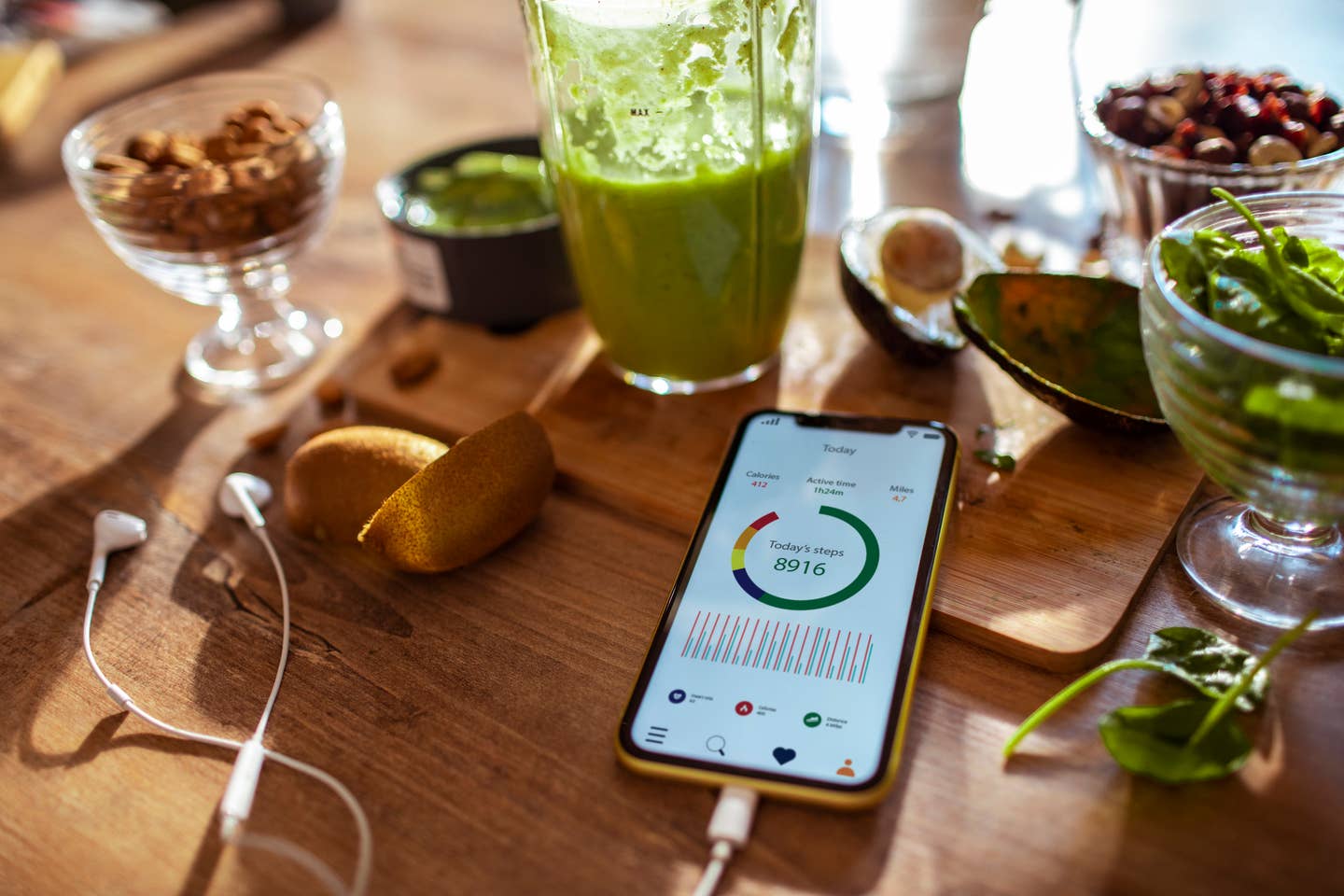
This Easy Gadget Helps You Go Keto and Finally Reach Your Weight Loss Goals
There are people who spend a lot of time and energy trying to "go keto," or figuring out if they are in a state of ketosis. Whether they are trying to lose weight by intermittent fasting or low-carb dieting, it's easy to think you're doing it right, and not see any results on the scale. The goal is to lower carb intake and produce ketones, for anyone who has not tried the popular keto diet, so that your body's fuel system switches over from carbs to fat. Getting into ketosis is hard (requires less than 5 percent carbs for fuel) and staying there is even more difficult. For these dieters, who we might call keto-obsessed, the goal can be elusive, frustrating, and lead to not only failing to lose weight but to load up on unhealthy animal fats like bacon, and skip eating healthy, nutrient-packed vegetables and fruit, for fear that these slow-burning natural carbs could undermine their efforts.
While no one wants to encourage any dieters to skip eating healthy, nutrient-filled vegetables and fruits, whole grains and nuts, seeds and legumes, there is a new gadget on the market designed to help you know when you are in ketosis, and by doing so, reach your weight loss goals. The company touts it as an alternative to urine sticks and finger prices. You simply breathe into a little black oval device, and once you see the numbers you want, you know that your body is burning fat. Then, once your weight-loss goals are met, you can switch back over to a healthier maintenance plan and add back in all the nutrient-rich foods that will fuel your healthy cells with antioxidants, vitamins, and minerals, and skip the bacon.
This little keto helper is a breathalyzer that reads your exhale for telltale ketones, so whether you're intermittent fasting or eating low-carb, you can now know when you've achieved a state of fat-burning, with a grade A medical device now available to the public, according to Jim Howard, CEO of Readout Health, which brought the device to market after two and a half years of development.
"It's essentially a breathalyzer, but instead of reading your blood alcohol level, it reads your ketosis levels and gives you feedback all day, throughout the day, without ever having to pee on a strip that you pee on several times a day (the current standard for keto followers). The small, sleek black tester sells for $299 and it tracks the state of fat burn at home. This device has been on the market for six months and if you were a "Shark" and Jim Howard walked into the Tank, you'd be tempted to pull out your checkbook.
The company that makes it, Readout Health, has been around since 2018 and was founded with a focus on the clinical applications of this medical device, which earlier this year got its rating as a "Class 1 medical device," according to Howard, who explains that this means it can be used by doctors and nurses in hospitals reliably as a medical tool. "Most wearables or handhelds are not medical, they are wellness devices," Howard explained from his office in Philadelphia. "This has gone through an extensive approval process."
It works by picking up ketones in your breath--where they appear. Previously you had to measure ketones appearing in your urine and your blood, an arduous task. Until now, no one has been able to figure out how to measure and capture this level of ketones in the breath, Howard explained.
The device has a pump and microphone so when you blow into it, deeply emptying your lungs, to get the bottom 5 percent of your exhaled breath, which contains the ketones, you get your feedback. The trick is exhaling fully enough, "since that's where your measurement lies, at the most concentrated oxygen levels in the lungs," he explains.
"In the lungs, the ketones interact with lung tissue to allow the device to detect their presence, he explains. "It's where the concentrated compounds lie, in your breath. So this is like a breathalyzer for fat burning."
Most dieters don't have a clue where they are in a state of burning fat as opposed to carbs, from hour to hour, so even if you go into ketosis you don't know if you are staying there. And most people don't know if they even have been able to put themselves into a state of fat burning. The deeper you get into it the faster you experience fat burn. You can do it through eating low-carbs (the healthy way to do keto is not by eating animal fat but by consuming a diet high in plant-based foods with healthy fats like avocado, olives, seeds and nuts).
Once upon a time, people knew they were in ketosis because their breath smelled like apples, Howard explained. Those were acetones. That is how people could tell you had diabetes. Because if you have type 1 diabetes, your ketone levels go up because you are not producing insulin, and it can get to the point that you are not able to store fat, and of course that can kill you: People suffered from ketoacidosis. But in modern-day, medicine has thankfully solved this problem, and now if you have diabetes, insulin pumps help regulate that.
"The levels change all throughout the day, so if you are using blood measurements, say, once a day, that only tells you what is going on in the past three hours,"Howard explained. "But if you take your trend line all day long with this method, you can see what is going on all day. It's like a continuous glucose monitor, which is used in diabetes or obesity."
Howard also says the device can be usedt to detect early signs of Alzheimer's. "Alzheimer's is also called type 3 diabetes because as a neurological disorder the brain stops recognizing insulin, and while. ketones are the preferred fuel for your heart and brain, which is why babies get so much fat, since their brains are so active, and they're growing. With Alzheimer's people tend to eat a lot of sweets. It's like their brains are not recognizing inulin, or that they just had sweets or carbs. So even if they ate recently, this disease can cause a new craving a short time later. This is why people with Alzheimer's are often hungry two hours later. They are not hungry but they are craving carbs. When the brain uses fat as fuel it has fewer cravings for carbs as fuel. It's complicated but there is a connection between ketones and dementia.
People with Alzheimer's can use the device
So the other use case is for the device is measuring the brain's uptake of carbs, Howard explains since "people with dementia have plaque deposits in their brain and for whatever reason, their brains burn more carbs than fat. And without that fat intake as brain fuel, the brain is going to rely on carbs. So right now, today, one primary treatment plan for early-stage dementia is nutritional ketosis. That is primary and accepted. So cutting out sugar... for these patients is important. And it's also smart if you have that gene or are predisposed for Alzheimer's."
So far the company has sold 2,000 devices, with no advertising. It has had coverage in Forbes, and it will likely be a gift item this year. To find out more go to MyBiosensse.com.
More From The Beet






